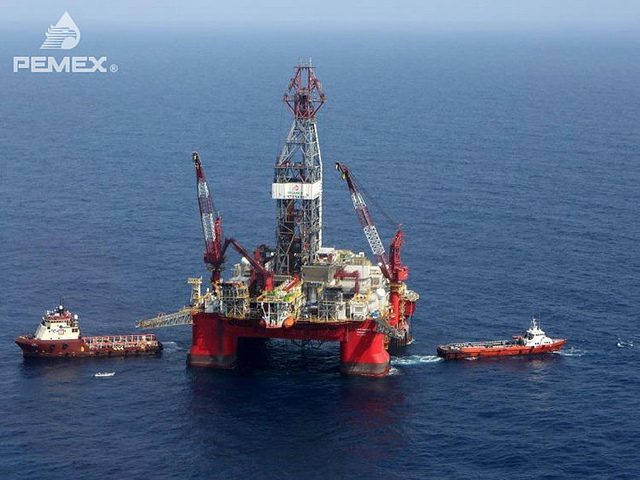Iranian Ship Linked to Houthi Attacks Heads Home Amid Tensions
(Bloomberg) — An Iranian ship that’s been linked to Houthi attacks in the Red Sea is returning home, removing a prominent asset in the area as the Islamic Republic braces...


The Grupo R-owned Centenario semisubmersible drilling rig operating in the Gulf of Mexico, image: PEMEX
![]()
![]()
MEXICO CITY, April 30 (Reuters) – Mexico’s government on Wednesday proposed a set of rules tailored toward attracting quick investment to its oil and gas industry as it mapped out how the state would end its domination of the sector.
Opting to set a lower bar than regional peers on how much local labor and materials investors will have to use, Mexico gave companies a decade to meet the target as it presented draft legislation to flesh out a radical energy reform from last year.
The reform is the core of President Enrique Pena Nieto’s plan to boost economic growth, and his government said “local content” requirements, which aim to strengthen the domestic oil and gas industry, would need to reach an average of 25 percent by 2025.
The so-called secondary laws unveiled on Wednesday offered a flexible model for the liberalization of the industry, experts said. It is being closely watched by oil majors such as BP Plc and Royal Dutch Shell.
The laws showed content requirements will vary on a case-by-case basis and will be detailed when contracts are put out to tender, all of which the government said would be public.
“They are emphasizing flexibility because they know that the mosaic of opportunities in the country require a different approach,” said Jeremy Martin, an energy expert at the University of California San Diego. “It seems they definitely drew from some lessons in Brazil, where you have much higher (content) percentages that are much more rigid.”
The content requirements in Brazil are as high as 55 percent for the development phase of the pre-salt offshore fields.
Mexico’s government also said on Wednesday it would cut the tax burden on state oil giant Pemex and guarantee it at least a 20 percent stake of business in deposits in Mexican territory that borders the United States.
Those measures and the local content rules are aimed at ensuring the energy reform benefits Mexico’s economy even as it seeks to lure foreign investors that would compete with Pemex.
Still, analysts say a confirmed discovery of a trans-border oil field in the Gulf of Mexico or on the country’s northern land border is at least a decade out.
LETTING GO
The government will also reduce its involvement in the national electricity utility known as CFE.
“The time has come for the finance ministry to let go of the administration of Pemex and the CFE,” Finance Minister Luis Videgaray told a joint news conference in Mexico City with Energy Minister Pedro Joaquin Coldwell.
Passed in December, Pena Nieto’s energy reform ends Pemex’s 75-year-old oil and gas monopoly. It aims to generate billions of dollars worth of private investment for the industry in Mexico, the world’s 10th biggest producer of crude oil.
The secondary laws show that the amount the government takes in taxes and royalties from specific projects will vary depending on the contract.
Aside from creating thousands of new jobs, Pena Nieto hopes the energy reform will deliver a significant boost in oil production, which has fallen by 25 percent since peaking at almost 3.4 million barrels per day in 2004.
The new laws would lower the fiscal burden on Pemex to an average of less than 65 percent of the company’s revenue from 79 percent currently, Videgaray said.
POLITICAL WRANGLE
The current session of Congress was to end on Wednesday and it is not formally due to reconvene until September. The government had hoped to pass the laws in the session but disputes with the opposition delayed them.
To speed up the process, Congress will call extra sessions and lawmakers hope to pass the energy laws by the end of June.
However, a backlog of legislation has built up in Congress and some officials in Pena Nieto’s Institutional Revolutionary Party, or PRI, say it might take longer than that.
The PRI, which created state oil giant Pemex in 1938 when it expropriated the assets of foreign oil companies, wants broad consensus over the energy laws and is counting on support from the opposition center-right National Action Party (PAN).
The PAN, which has been riven by in-fighting amid a bitter party leadership contest, has made its support on energy conditional on the passing of an electoral reform that will weaken the PRI’s longstanding domination of Mexican politics.
Those negotiations on electoral reform have advanced more slowly than the PRI had hoped in Congress.
Pena Nieto also faces resistance from the left, whose biggest group, the Party of the Democratic Revolution (PRD), hopes to force a referendum to overturn the energy reform.
Luis Sanchez, a PRD senator, said the reform had not been properly discussed in Congress and accused the government of planning to pass the secondary laws in late June “when people are distracted by the (soccer) World Cup.” (Writing by Dave Graham; Editing by Kieran Murray and Chizu Nomiyama)
(c) 2014 Thomson Reuters, All Rights Reserved
Join the gCaptain Club for curated content, insider opinions, and vibrant community discussions.


Join the 105,984 members that receive our newsletter.
Have a news tip? Let us know.
Access exclusive insights, engage in vibrant discussions, and gain perspectives from our CEO.
Sign Up




Maritime and offshore news trusted by our 105,984 members delivered daily straight to your inbox.



Essential news coupled with the finest maritime content sourced from across the globe.
Sign Up